Letters from Frank John Mulcahy to his family, 1941-1945 - Part 3
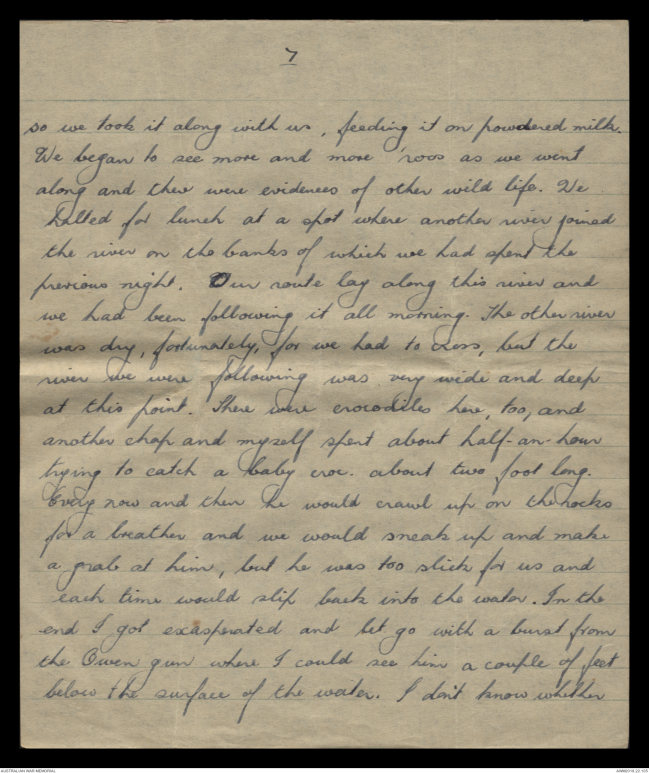
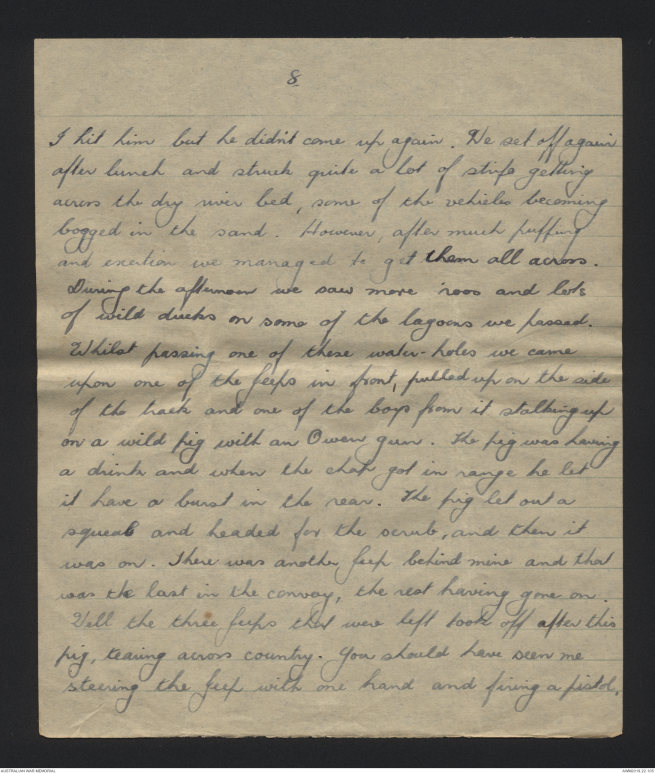
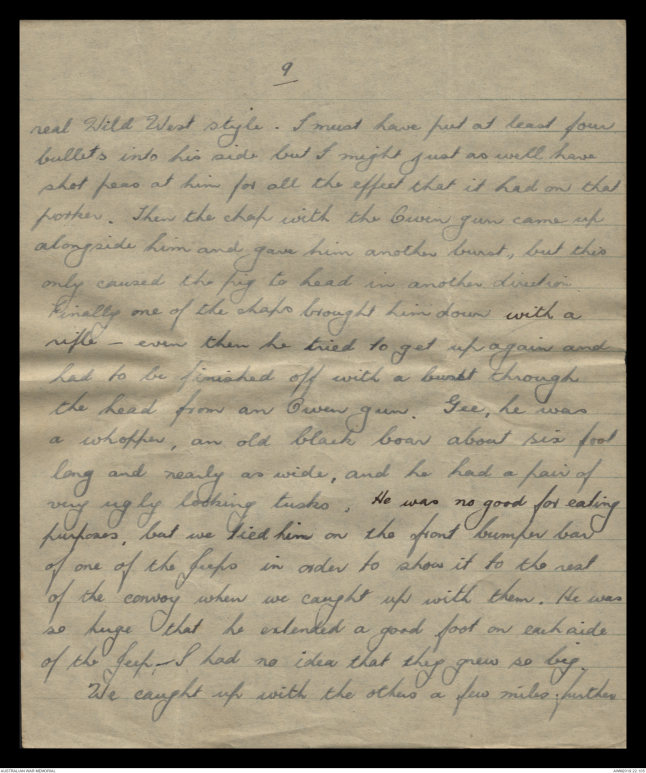
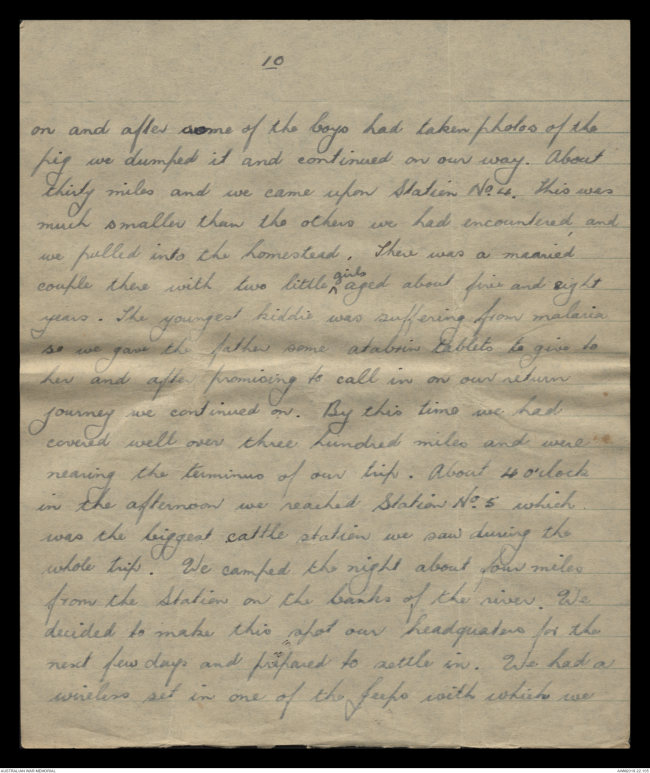
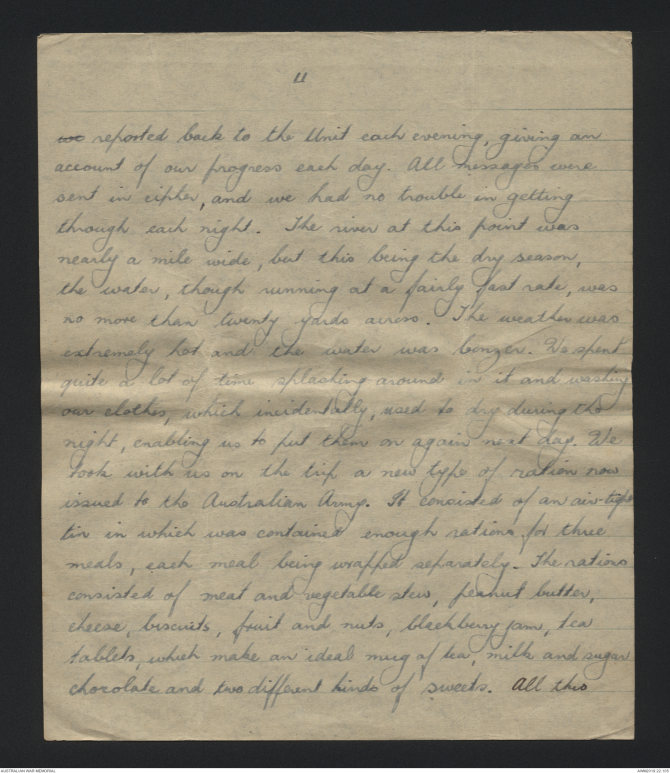
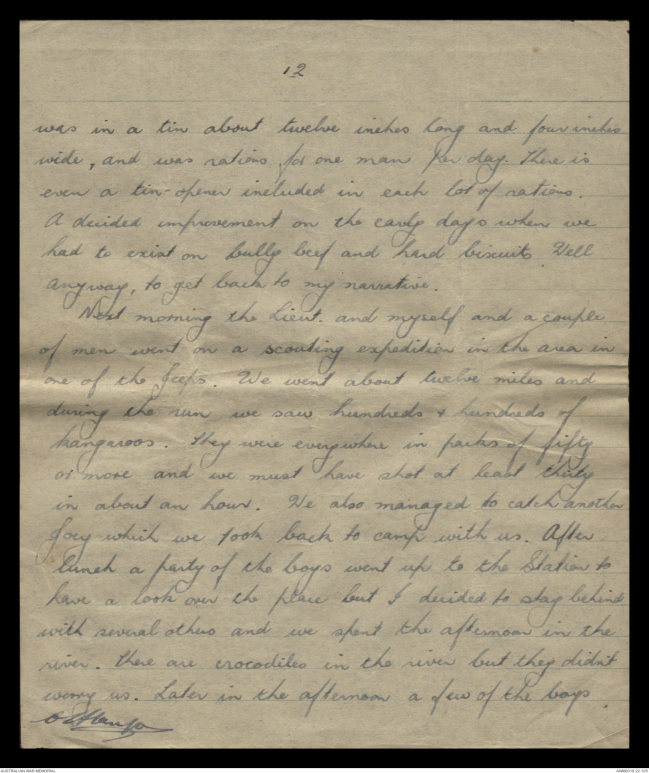
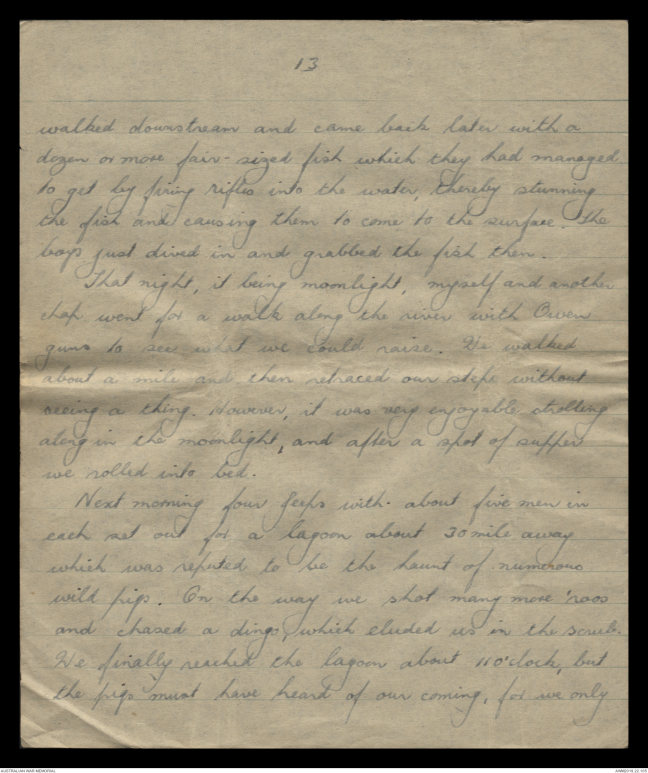
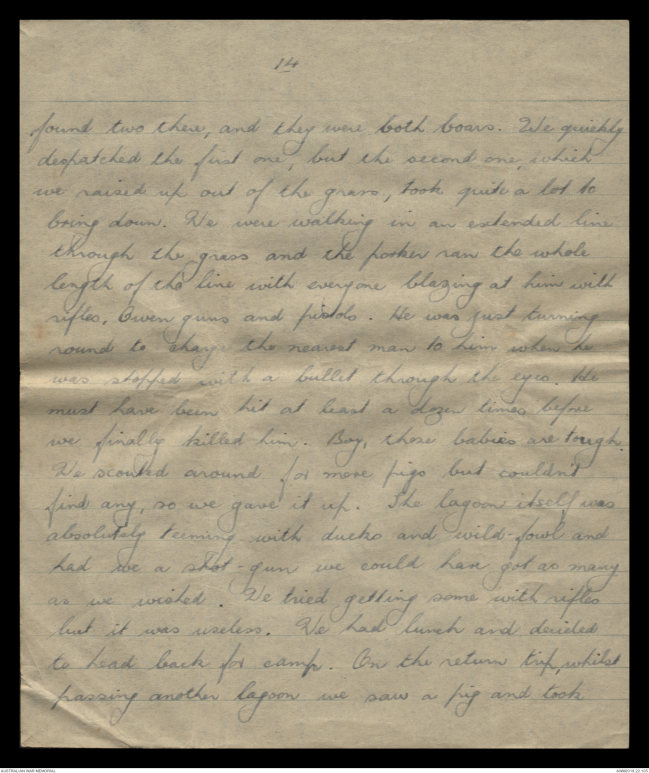
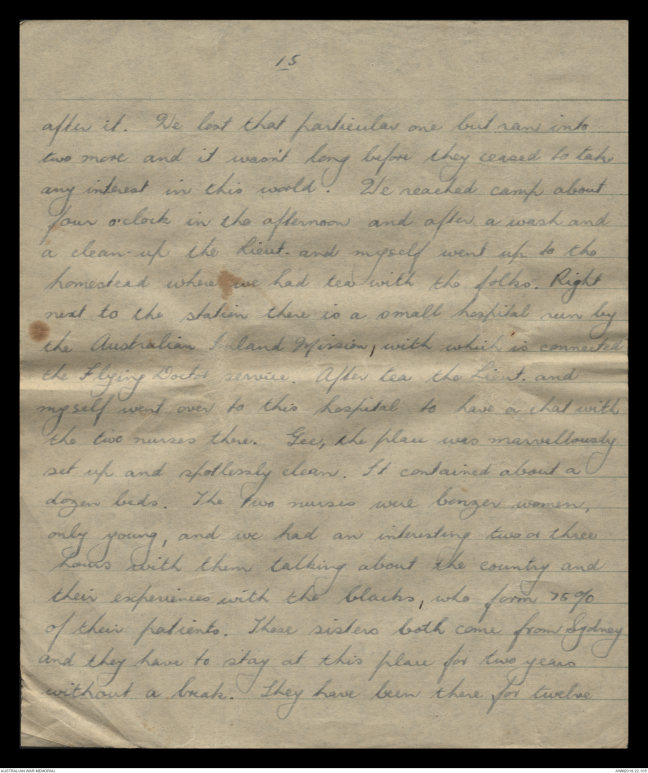
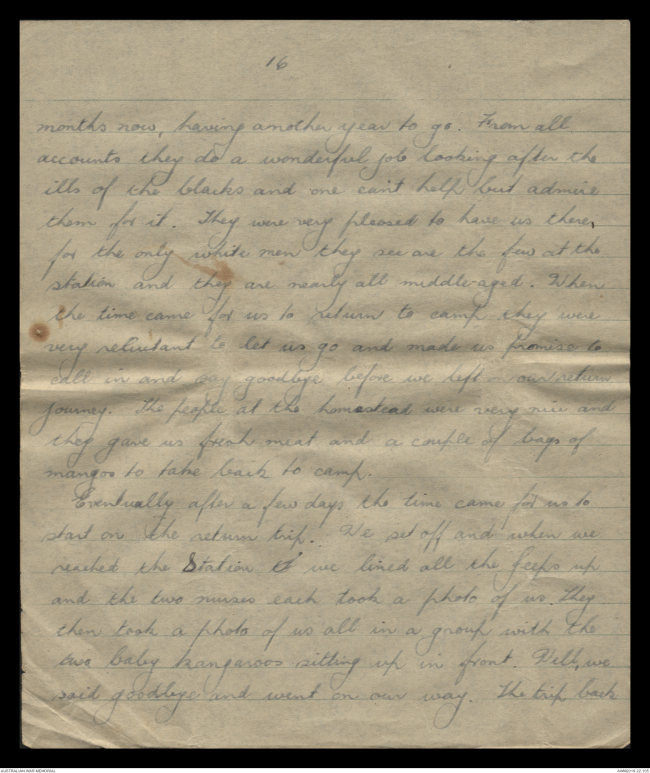
7
so we took it along with us, feeding it on powdered milk.
We began to see more and more 'roos as we went
along and there were evidences of other wild life. We
halted for lunch at a spot where another river joined
the river on the banks of which we had spent the
previous night. Our route lay along this river and
we had been following it all morning. The other river
was dry, fortunately, for we had to cross, but the
river we were following was very wide and deep
at this point. There were crocodiles here, too, and
another chap and myself spent about half-an-hour
trying to catch a baby croc. about two foot long.
every now and then he would crawl up on the rocks
for a breather and we would sneak up and make
a grab at him, but he was too slick for us and
each time would slip back into the water. In the
end I got exasperated and let go with a burst from
the Owen gun where I could see him a couple of feet
below the surface of the water. I don't know whether
8
I hit him but he didn't come up again. We set off again
after lunch and struck quite a lot of strife getting
across the dry river bed, some of the vehicles becoming
bogged in the sand. However, after much puffing
and exertion we managed to get them all across.
During the afternoon we saw more 'roos and lots
of wild ducks on some of the lagoons we passed.
Whilst passing one of these water-holes we came
upon one of the Jeeps in front, pulled on the side
of the track and one of the boys from it stalking up
on a wild pig with an Owen gun. The pig was having
a drink and when the chap got in range he let
it have a burst in the rear. The pig let out a
squeal and headed for the scrub, and then it
was on. There was another Jeep behind mine and that
was the last in the convoy, the rest having gone on.
Well the three Jeeps that were left took off after this
pig, tearing across country. You should have seen me
steering the Jeep with one hand and firing a pistol,
9
real Wild West style. I must have put at least four
bullets into his side but I might just as well have
shot peas at him for all the effect that it had on that
porker. Then the chap with the Owen gun came up
alongside him and gave him another burst, but this
only caused the pig to head in another direction.
Finally one of the chaps brought him down with a
rifle - even then he tried to get up again and
had to be finished off with a burst through
the head from an Owen gun. Gee, he was
a whopper, an old black boar about six foot
long and nearly as wide, and he had a pair of
very ugly looking tusks, He was no good for eating
purposes, but we lied him on the front bumper bar
of one of the Jeeps in order to show it to the rest
of the convoy when we caught up with them. He was
so huge that he extended a good foot on each side
of the Jeep - I had no idea that they grew so big.
We caught up with the others a few miles further
10
on and after some of the boys had taken photos of the
pig we dumped it and continued on our way. About
thirty miles and we came upon Station No. 4. This was
much smaller than the others we had encountered, and
we pulled into the homestead. There was a married
couple there with two little ^girls aged about five and eight
years. The youngest kiddie was suffering from malaria
so we gave the father some atabrine tablets to give to
her and after promising to call in on our return
journey we continued on. By this time we had
covered well over three hundred miles and were
nearing the terminus of our trip. About 4 o'clock
in the afternoon we reached Station No. 5 which
was the biggest cattle station we saw during the
whole trip. We camped the night about four miles
from the Station on the banks of the river. We
decided to make this spot our headquarters for the
next few days and prepared to settle in. We had a
wireless set in one of the Jeeps with which we
11we reported back to the Unit each evening, giving an
account of our progress each day. All messages were
sent in cipher, and we had no trouble in getting
through each night. The river at this point was
nearly a mile wide, but this being the dry season,
the water, through running at a fairly fast rate, was
no more than twenty yards across. The weather was
extremely hot and the water was bonzer. We spent
quite a lot of time splashing around in it and washing
our clothes, which incidentally, used to dry during the
night, enabling us to put them on again next day. We
took with us on the trip a few type of ration now
issued to the Australian Army. It consisted of an air-tight
tin in which was contained enough rations for three
meals, each meal being wrapped separately. The rations
consisted of meat and vegetable stew, peanut butter,
cheese, biscuits, fruit and nuts, blackberry jam, tea
tablets, which make an ideal mug of tea, milk and sugar
chocolate and two different kinds of sweets. All this
12
was in a tin about twelve inches long and four inches
wide, and was rations for one man per day. There is
even a tin-opener included in each lot of rations.
A decided improvement on the early days when we
had to exist on bully beef and hard biscuits. Well
anyway, to get back to my narrative.
Next morning the Lieut. and myself and a couple
of men went on a scouting expedition in the area in
one of the Jeeps. We went about twelve miles and
during the run we saw hundreds & hundreds of
kangaroos. They were everywhere in packs of fifty
or more and we must have shot at least thirty
in about an hour. We also managed to catch another
Joey which we took back to camp with us. After
lunch a party of the boys went up to the Station to
have a look over the place but I decided to stay behind
with several others and we spent the afternoon in the
river. There are crocodiles in the river but they didn't
worry us. Later in the afternoon a few of the boys
[[*?*]]
13
walked downstream and came back later with a
dozen or more fair-sized fish which they had managed
to get by firing rifles into the water, thereby stunning
the fish and causing them to come to the surface. The
boys just dived in and grabbed the fish then.
That night, it being moonlight, myself and another
chap went for a walk along the river with Owen
guns to see what we could raise. We walked
about a mile and then retraced our steps without
seeing a thing. However, it was very enjoyable strolling
along in the moonlight, and after a spot of supper
we rolled into bed.
Next morning four Jeeps with about five men in
each set out for a lagoon about 30 mile away
which was reputed to be the haunt of numerous
wild pigs. On the way we shot many more 'roos
and chased a dingo, which eluded us in the scrub.
We finally reached the lagoon about 11 o'clock, but
the pigs must have heard of our coming, for we only
14
found two there, and they were both boars. We quickly
despatched the first one, but the second one, which
we raised up out of the grass, took quite a lot to
bring down. We were walking in an extended line
through the grass and the porker ran the whole
length of the line with everyone blazing at him with
rifles, Owen guns and pistols. He was just turning
round to charge the nearest man to him when he
was stopped with a bullet through the eyes. He
must have been hit at least a dozen times before
we finally killed him. Boy, those babies are tough.
We scouted around for more pigs but couldn't
find any, so we gave it up. The lagoon itself was
absolutely teeming with ducks and wild-fowl and
had we a shot-gun we would have got as many
as we wished. We tried getting some with rifles
but it was useless. We had lunch and decided
to head back for camp. On the return trip, whilst
passing another lagoon we saw a pig and took
15
after it. We lost that particular one but ran into
two more and it wasn't long before they ceased to take
any interest in this world. We reached camp about
four o'clock in the afternoon and after a wash and
a clean-up the Lieut. an myself went up to the
homestead where we had tea with the folks. Right
next to the station there is a small hospital run by
the Australian Inland Mission, with which is connected
the Flying Doctor service. After tea the lieut. and
myself went over to this hospital to have a chat with
the two nurses there. Gee, the place was marvellously
set up and spotlessly clean. It contained about a
dozen beds. The two nurses were bonzer women,
only young, and we had an interesting two or three
hours with them talking about the country and
their experiences with the blacks, who form 75%
of their patients. These sisters both come from Sydney
and they have to stay at this place for two years
without a break. They have been there for twelve
16
months now, having another year to go. From all
accounts they do a wonderful job looking after the
ills of the blacks and one can't help but admire
them for it. They were very pleased to have us there,
for the only white men they see are the few at the
station and they are nearly all middle-aged. When
the time came for us to return to camp they were
very reluctant to let us go and made us promise to
call in and say goodbye before we left on our return
journey. The people at the homestead were very nice and
they gave us fresh mean and a couple of bags of
mangos to take back to camp.
Eventually after a few days the time came for us to
start on the return trip. We set off and when we
reached the Station I we lined all the Jeeps up
and the two nurses each took a photo of us. They
then took a photo of us all in a group with the
two baby kangaroos sitting up in front. Well, we
said goodbye and went on our way. The trip back
 CMA
CMAThis transcription item is now locked to you for editing. To release the lock either Save your changes or Cancel.
This lock will be automatically released after 60 minutes of inactivity.